Power Couples in the World of Speculative Fiction: Jim Freund and Barbara Krasnoff
Crowens: You guys are native Brooklyners, right?
Both: No.
Barbara: I’m the native Brooklyner. He’s from Queens.
Jim: I’m from Jackson Heights. She is from Canarsie… originally. It’s like the line from Captain America: Civil War when he meets Spider-man. Captain America is fighting him at the airport and says, “You’ve got heart, kid. Where are you from?” and Spider-man says, “Queens.” Captain America looks at him and says in a confrontational tone, “Brooklyn.”
(Laughs): That’s great.
Jim: Best line in the movie.
How did you guys meet?
Barbara: Online, basically.
Jim: When? We’re not sure.
Barbara: We were on several of the same bulletin board systems.
We corresponded for a while through the various bulletin boards systems with different aliases until we actually met in person.
Were these chat rooms or were these specific to speculative fiction?
Jim: Open bulletin board systems. There were no chat rooms back around 1981.
Then that’s really before the general internet and email.
Barbara: Before the web.
Jim: But not before the Internet. Only one person could be online at one time. A bulletin board was a computer with a phone, and somebody called up. They were using the computer to post and read on the BBS (Bulletin Board System), and anyone else who tried calling at the same time got a busy signal until that person gets off.
Barbara: Some people eventually got systems where they had two or three lines going in.
Jim: Then they could not exactly chat, but they could use something called Yell, kind of like text messages.
Barbara: Where more than one person can leave a message at the same time. For the most part, you called up and hoped you didn’t get a busy signal.
You said this was around ’81? I didn’t own a computer back then.
Jim: We didn’t meet in person until approximately Memorial Day in 1988. Every so often, members of our preferred BBS called Chelsea Square would get together for what they called meaningless hang, which today we’d call a meet-up, and we’d go to a movie, and at that time it was the opening of Willow.
Barbara: A friend created a poster for us, which we still have to this day, because most of us didn’t know what each other looked like.
Jim: This particular BBS was less anonymous and focused more on intellectual discussion rather than what games are you playing, and can I download one, which were all that a lot of BBSs consisted of. There was less reason to use pseudonyms or handles, as they were called. At a later date after we initially met, Barbara called me up.
How did you find out about these BBSs?
Barbara: Through other BBSs. Also we’d find out about what was going on from the BBS owner.
Jim: There were magazines.
Barbara: There were also ones whose sole purpose was to list BBSs for certain interest groups.
Jim: An Atari BBS would have tips and tricks, and you’d find out about it from an Atari magazine. I subscribed and also wrote for a magazine called Atari News And Lots Of Games… or ANALOG Magazine — no relationship to the science fiction magazine, and this type of magazine would list Atari-related BBSs all over the world.
Barbara calls me up at my job, and since these were the days of networking, I had actually met my boss through a BBS. Jerry Rubin’s favorite word… She asked me if I wanted to meet her at Barnes and Noble on Eighth Street in the Village after work, and I said, “Sure.” So, I go down there… and we had about five people in my group at work who were also in that BBS… so I said, “You know BarbK from the Chelsea Square and Magpie Bulletin Board?” and one guy said, “Oh yeah,” and I invited him to come with me and didn’t realize it at the time she was asking me on a date.
Barbara: I was a little startled when I arrived and saw the two of them.
Jim: That I brought a chaperone, and I never picked up that this was a date. My friend saw the look on Barbara’s face and said, “See you later.” I think she had to explain it to me… still.
Since that was back in 1988, you were already doing your Hour of the Wolf show.
Jim: Since 1972.
(To Barbara): Were you also involved in speculative fiction back then?
Barbara: In ’79-’81 I worked for a magazine called Future Life, which was put out by Starlog. It was something like Omni, but without the budget.
Jim: It was like a cross between Omni and Cosmos, David G. Hartwell’s magazine.
Barbara: I was the managing editor and low man on the totem pole, but it was a great little magazine. A small staff — Robin Snelson, Ed Naha and me. We had artists, science articles, interviews of science fiction people. We had a column by Harlan Ellison. I wrote under three or four different names, because we had a little area in front with short articles, and we didn’t want it to be known that we could only afford to hire one or two writers. I wrote features, as well. It was a lot of fun, but didn’t last very long.
Eventually Starlog felt we were too expensive, and they dropped the magazine. Starlog also had a horror magazine called Fangoria.
Barbara: Back then, not only did I write articles for others, but I wrote a YA non-fiction book called Robots: Reel to Real (Arco Publishing, 1981) about movie robots compared to real robots, which were at that time mostly industrials and some of the fake robots they’d have at fairs, and things like that. It sold mostly to schools and libraries and did fairly well, but I was also trying to write science fiction. I always read it and took creative writing back in college at the State University of New York in Binghamton from 1971-1975. Joanna Russ [Crowens: Hugo, Nebula, Locus, James Tiptree, Jr. Award winner associated with the New Wave movement of science fiction] was there for the first three years that I was there. First she taught a general lecture on science fiction — Science Fiction 101, but it was on a very basic level and I knew this stuff already.
Then she announced she was going to do a senior workshop. Well, I went running. I remember sitting outside her office waiting for a critique of the material I submitted to get into the class. I remember nothing about what she said about my story, but I do recall listening to her yelling at a poor young woman, because she had written a science fiction story with a male protagonist. Why couldn’t there have been a woman? Why did it have to be a man? At any rate, I made it into her class and was absolutely thrilled and… then she left the university. So, I never got to take the class and was really disappointed.
In 1989, one of the first stories I wrote was “Signs of Life” about a society where the only people who could be starship pilots were deaf. I ran into trouble, because I sent it to Amazing Stories and didn’t hear back from them so I assumed it was rejected. So I sent it to a women’s science fiction anthology, Memories and Visions. They accepted it within a few weeks, and I was thrilled until two days later when I also got an acceptance to publish the same story in Amazing. Everything worked out in the end, because Memories and Visions was being published by a small press with a relatively low circulation, so I actually ended up selling that story twice.
(To Jim): What’s your educational background?
Jim: After not finishing the ninth grade… the second time, I was done. How’s that? I finished it the first time, and they liked me so much they wanted me to do it again. I was already working at the radio station for three years at that point. My choice was to either go full-time at the radio station or continue cutting school or a combination of the two, so the day I became eligible to drop out, I did.
Have you always been interested in radio?
Jim: Given that I started at the age of thirteen, and I had been listening to radio a few years before that… which is why I went there. So, yes. It wasn’t so much that I was interested in radio as I was interested in WBAI, because WBAI was and is a culture unto itself.
Do you care to elaborate for people who are unfamiliar with WBAI?
Jim: Pacifica Radio, which began in Pacifica, California where Starfleet was located. Any Star Trek fan can tell you that. Until Khan destroyed it in one of the movies. We were the third station. WBAI was donated to the Pacifica Corporation by an eccentric millionaire, when millionaire meant something in 1960, and turned into a Pacifica station at that time. My uncle listened to it voraciously — the same person who got me reading science fiction around the age or six or seven. He brought me to the radio station to answer phone calls during a fundraising drive. WBAI was the creation of listener-sponsored radio. Donated money is almost the only money we get — no matching government grants. This started thirty years before NPR and PBS existed. Pacifica was the first. This is distinct from WNYC. Although non-commercial, WNYC was owned by the City of New York.
As a result, they had eclectic programming that always included science fiction, because their drama and literature director was Baird Searles who was, coincidentally, the book critic at Asimov’s SF and the movie critic for The Magazine of Fantasy and Science Fiction. He also did the first radio program for the gay community.
When critics were saying that radio drama was dead, authors like Theodore Sturgeon, Tom Disch and Samuel R. Delany came in and wrote for him, and Joanna Russ worked as the “script girl” checking continuity, as well as producing some shows of her own. At that point I had graduated from answering phones to being the gofer. By this time, I’m probably fourteen. Why would I leave? And this is while Baird’s partner, Martin Last, was producing programs like Songs and Poems of Middle Earth. That or school? That’s what pretty much convinced my father to sign the papers allowing me to drop out.
I befriended Margot Adler who originated the Hour of the Wolf radio show. It had started out five days a week. Thursdays and Fridays were the science fiction mornings. I was the co-host for those, and I engineered most of the other mornings for Margot. In 1973, Margot got accepted to the Clarion Writers Workshop. That’s when I took over her show and never gave it back. When she returned, she got a prime time slot. Eventually, I had to cut my five-day schedule down to one show per week, and we are all unpaid staff. Meanwhile, I worked anything and everything to earn money on the side. Around 1988, many of the members of our BBS were being hired by Ziff Davis for a project called ZiffNet. By coincidence, there was a person on the same floor where I had my office…
(Laughing): I suspect I know where this is going. (Turns to Barbara) Was this PC Magazine?
Barbara: I started at Ziff Davis’ PC Magazine in 1983, and I was there for about two to three years. Then I freelanced for a while, worked at a magazine called Personal Computing, and eventually ended up back at Ziff Davis. First I was at a magazine called PC Sources, and that died, but then they hired me on to Computer Shopper.
Jim: And the service I was hired for, ZiffNet, was hosted on CompuServe. All the magazines were supposed to be represented but the editors couldn’t understand why we’d be giving away stuff for free that other people subscribe for in other magazines. My job was to be a liaison between the top editors of the magazines. There was one called PC MagNet, run by a fellow named Rick Ayre. Rick didn’t stay very long, because some friend of his named Jeff was starting a new company called Amazon, and Rick was like… the fourth employee there. I think he owns a couple of countries now. He stayed with Amazon for about ten years, bought an island or something and is living a wonderful life.
You were still doing a 5:00 a.m. show the same time you were working at Ziff Davis, right?
Jim: I was doing that show from 5:00 – 7:00 a.m. for 37 years. Then I was cancelled and brought back about three weeks later, partly thanks to a letter writing campaign. Now, I’m in the Wednesday night/Thursday morning slot from 1:00 – 3:00 a.m., which is no longer the actual Hour of the Wolf, but I keep the title.
The Hour of the Wolf is the morning twilight. It’s an ancient belief of the Romans that it’s a magical time, but Margot Adler got it from a 1967 movie by the same name by Ingmar Bergman. It’s a lesser Bergman film, but lesser Bergman films can be better than most people’s masterpieces. In Sweden where the movie occurs, the morning twilight can be two or three hours long. Stephen Sondheim gets into it in A Little Night Music.
And this was for five days a week?
Jim: Only for two and a half years. One thing I’d like to point out is the irony that the radio show was named after a movie. Now, there’s a recent art film that’s been named after the radio show called The Wolf Hour, starring Naomi Watts. It played once at the Sundance Film Festival. Barbara found out about it because she did a Google search on my name, and a review of the movie mentions that the lead character listens to my show. It actually mentions my name in the review that means somehow the radio show and I are in the movie.
Barbara: We haven’t been able to find a copy of it yet.
When was this released?
Jim: At Sundance… two months ago, I guess, to get a distributor, but it hasn’t been released to the public yet. Presumably it sold. Otherwise it would’ve been shown at the next big film festival.
(To both): I’m curious, what drew you toward speculative fiction in particular?
Barbara: It’s hard for me to say, because I graduated from fairy tales to science fiction. It’s always been a part of my life. I went from A Wrinkle in Time to adult science fiction fairly quickly. Along with everything else, I was a voracious reader and I still am, but I don’t just read science fiction. I’m also big on 19th century English literature and a lot of other things.
So you definitely came from the literature end rather than from watching movies?
Barbara: Definitely from literature.
(To Jim): Same with you?
Jim: My uncle chose books for me, and my mother read them to me, and he read them to me on occasion. They were the Heinlein juveniles, Ray Bradbury, Theodore Sturgeon…
Barbara: Some of the early science fiction books I read, even before I could really understand them, were my father’s. He read a great deal. My mother was an elementary school teacher. I had no choice. I had to become a good reader.
I find this entirely fascinating, because I grew up in a house with about four books and a stack of my father’s Playboys on the back of the toilet that we weren’t supposed to look at despite the fact they were out in the open.
(To Jim): What are some of your favorite people you’ve interviewed? Were they some of your favorite authors, and is there anybody still on your wish list that you haven’t interviewed but you’d really like to? Also, who is no longer around who you regretfully missed out in interviewing?
Jim: I got Phillip K. Dick, but the conversation was so scattered that there was no point to it whatsoever. I wish I had gotten a good interview with him. I had Joanna Russ repeatedly. I had Le Guin. I spoke to Tolkien but never interviewed him.
Ursula K Le Guin and Jim Freund at a NYRSF reading in New York City in 2000. Photo by Melissa Beckman.
Did you really?
Jim: I spoke to him in mid-’71 just to get a pronunciation on a name. We were doing a production of the Council of Elrond from The Lord of the Rings. It wasn’t exactly an interview, but one of the people involved with the production gave me a phone number to call, and Tolkien answered the phone.
People I haven’t interviewed who are around? I would like to interview J.K. Rowling, but not to talk about Potter. To talk about her, because she’s built an empire — something women generally don’t get to do. After about the third or fourth movie, I got to meet her for around thirty seconds coming in and out of Margot Adler’s house, but I’d love to interview her. I’m more interested in how she was able to maintain success as a businesswoman than I am about Potterville. I’d also like to interview C. J. Cherryh.
My favorite interviews? Rick Bowes — a vastly underestimated and underexposed author who I think is as good as many celebrated greats, but hasn’t gotten the attention. He’s always a charm to have on the air. Delany, because he’s Delany, and he was on WBAI before I was and knows how to do radio.
Barbara, you have a new book coming out. Tell us all about it, and what it was like working with your publisher, Mythic Delirium.
Barbara: They’ve bought several of my stories in the past. Mike Allen and his wife, Anita, are an absolute wonder to work with — probably better than most publishers. Basically, I’ve been writing and publishing stories for many years.
Jim: Barbara discovered that when she approached a lot of other publishers, they said they’d be glad to publish her collection of short stories as soon as they got a novel of hers.
Barbara: I’ve tried, but I haven’t been able to finish a novel-length manuscript. But when I was trying to put a collection together we realized that a lot of my stories had the same characters, or they were the daughters or grandchildren of those people. I took those stories and put them into two family trees, and it turned out that I had one vaguely based on my family and one on Jim’s family. Then I tweaked them with circumstances and dates and began to try to sell it. The problem was that even though I was calling it a mosaic novel, which is what Rick Bowes and Kage Baker called those kind of works, I was still running into people not wanting to publish collections.
Barbara at the NYRSF readings. Photo by Elizabeth Crowens
Do you mind defining a mosaic novel?
Barbara: Basically it’s a group of stories that are associated with each other and that, together, tell a larger story. Not necessarily a linear narrative, but they share characters. They share worlds.
Jim: A seed might be planted in one story and blossoms into a flower in a later story.
Barbara: In this case it focuses on two Jewish families, one from Eastern Europe and the other from Germany. It starts with a story called “A Clearing in the Autumn” about a young girl who finds a secret, magical place in a small wooded area within a city park in the Ukraine, and she meets another young girl from a German town.
Jim: It’s magical, because two girls from two different parts of the world can get there in a ten minute walk.
Mythic Delirium authors Barbara Krasnoff, Mike Allen, publisher, and Theodora Goss at NYRSF in NYC
Barbara: She doesn’t even know it’s magical until the other girl shows up. After becoming good friends at their first encounter, they swear they’ll see each other again. Of course, this is the day before WWI breaks out. The rest of the book follows their separate families, and occasionally the two families do mix but it finally gets to the point where their great-great granddaughters fulfill that promise. Some of the stories are fantasy. Some are pure science fiction. Some are comedy. Some are tragedies. If asked how long it took me to write it, it’s very hard to say, because it’s based on stories I’ve written over many years and then it took a couple years to assemble.
Jim: Working with Mike Allen and his wife, Anita, was so good, because they were working with Barbara every step of the way.
(To Barbara): Do you think you’re going to work on another mosaic novel?
Barbara: I should probably have had another manuscript ready for when it comes out, but I haven’t been able to do that. Since I find it so difficult to come up with one big long story, maybe I can come up with a new universe and invent a bunch of stories within that universe.
That might be your strong point.
(To Barbara): I didn’t ask you who are your favorite authors.
Barbara: Well, I can give you a terribly incomplete list. They include Ursula K. Le Guin, Joanna Russ, Alice Sheldon in both her personas, Sabrina Vourvoulias, Nalo Hopkinson, Octavia Butler, Richard Bowes, Jeffrey Ford, C. J. Cherryh, James Morrow, Samuel R. Delany, Jane Yolen and N. K. Jemisin. And there are lots more.
(To Jim): One last thing I forgot to ask. Are you recording audio books?
Jim: I am the Post-Production Editor and also host of Lightspeed magazine’s weekly podcasts. I’m also the audio editor for Nightmare magazine. John Joseph Adams, the publisher and editor, hired me to do post-production, and a company called Skyboat Media out in California produces the podcast. They record out in Hollywood and send me the material. I edit it, and add the introduction and sound effects. I’m the host of the show. Through them I also put together a collection of interviews called Chatting Science Fiction available at Audible and wherever people get their audiobooks. I’ve audio-editing on about eighteen projects for Skyboat that have little or nothing to do with John, and I have produced one audiobook for a novel that I got them to purchase the rights for — Elysium by Jennifer Brissett. Of course, I would love to be involved with producing the audiobook version of The History of Soul 2065, Barbara’s new book.
Jim Freund’s website: hourwolf.com
Hour of the Wolf is a two-hour live radio program presenting science fiction, fantasy, and related fields. He also produces, hosts, and streams The New York Review of Science Fiction Reading series.
Jim and Barbara also host the NYRSF or the New York Review of Science Fiction Readings held monthly at Brooklyn Commons. https://www.nyrsf.com/
Barbara Krasnoff has had short stories appear in over 35 publications; these include “Sabbath Wine,” which was a finalist for the 2016 Nebula Award for Best Short Story. Her mosaic novel The History of Soul 2065 will be published by Mythic Delirium Books on June 11, 2019. When not producing weird fiction, she works as Reviews Editor for The Verge and investigates what animals and objects are really thinking in her Backstories series on Facebook, Twitter and Instagram (#theirbackstories). You can find her at Brooklynwriter.com or on Twitter as @BarbK.
Elizabeth Crowens, Hollywood veteran and award winning author of the Time Traveler Professor series has been a regular contributor to Black Gate. elizabethcrowens.com
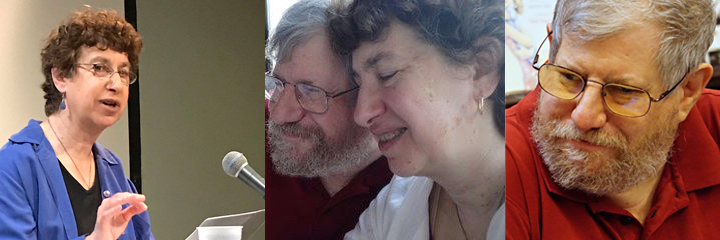
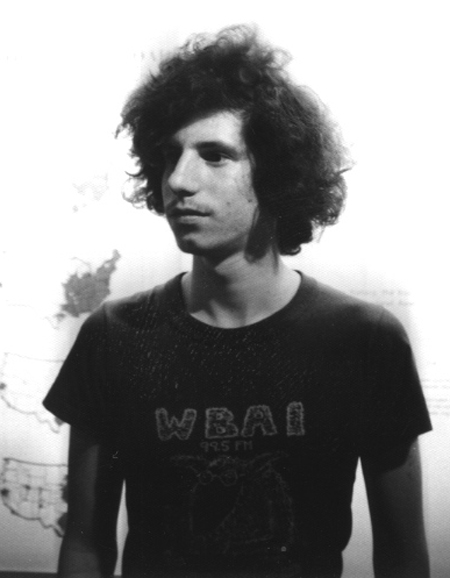
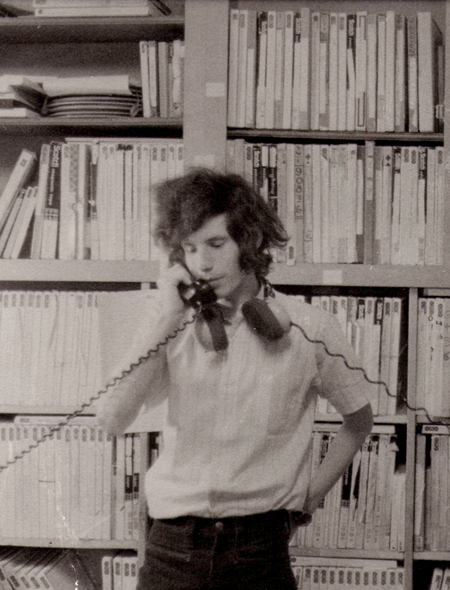
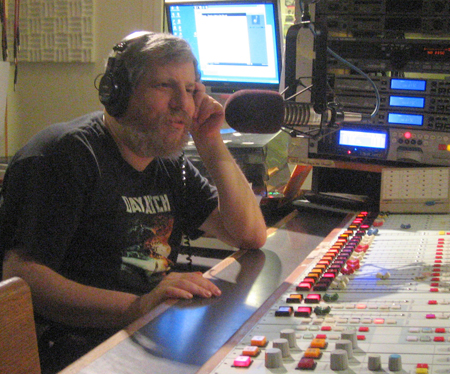
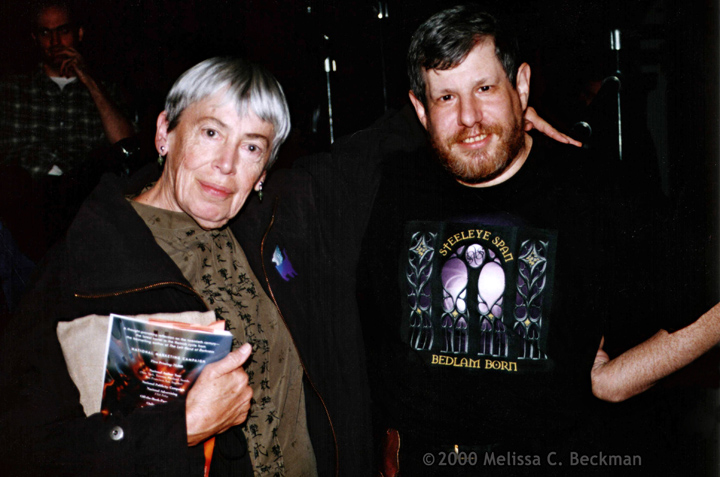
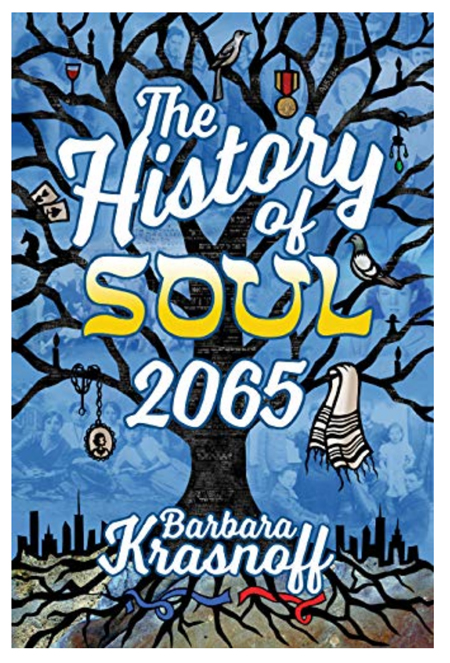
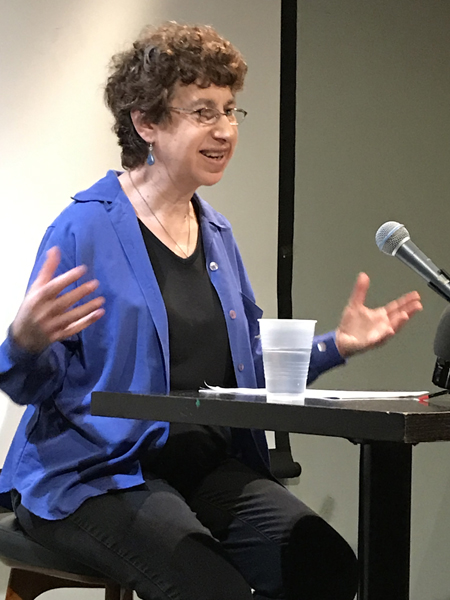
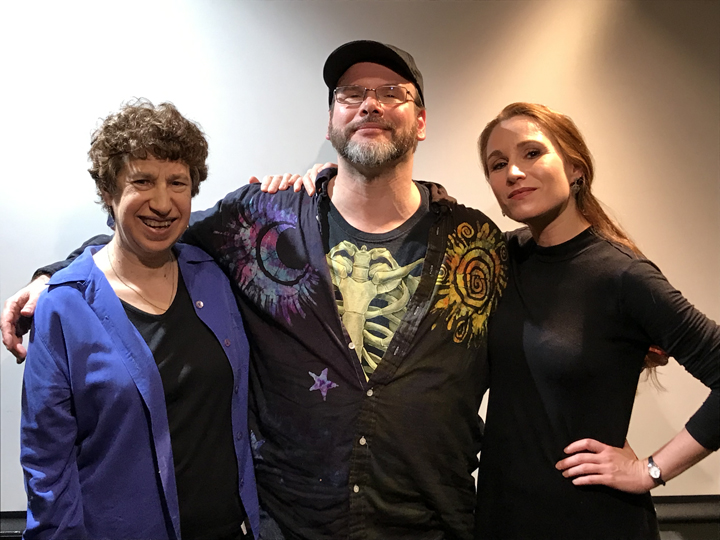
Terrific interview!
And it was great to see a shout-out for Rick Bowes, who doesn’t get nearly the attention he deserves. We published a story of his in Black Gate 2, and he gave me permission to reprint a very short piece on three of his early novels here a few years ago:
https://www.blackgate.com/2016/01/23/we-all-have-to-start-somewhere/
Agreed, an excellent interview, Ms. Crowens!
I have had the pleasure of meeting Mr. Freund and Ms. Krasnoff at sf conventions (usually Readercon), and they are as friendly and chatty and full of good stories in person as they are in the interview. Alas, I rarely listen to Hour of the Wolf in its new timeslot. I could wake up for the 5 a.m. version, but 1 a.m. is about when my brain shuts down for nightly maintenance. I do make the extra effort for the annual broadcast of “The Council of Elrond”, though.
[…] anyway — Jim Freund and I were interviewed by Elizabeth Crowens and are now featured in an article about power couples in speculative fiction at Black Gate. It’s a fun article — we talk about how we met online on the old BBS […]
[…] Kaffeeklatsches: Jim Freund, Barbara Krasnoff 4:00 PM, Concierge Lounge Jim and I will be having a Kaffeeklatsche together! That’s going to be interesting especially since it will be my first. (I wonder if they put us together because of that article that Elizabeth Crowens wrote about us in Black Gate?!?) […]
[…] “Power Couples in the World of Speculative Fiction: Jim Freund and Barbara Krasnoff” […]
Your article is very good and useful, thank you for sharing, bk8 hopes that next time you will have more good articles to send to all readers.